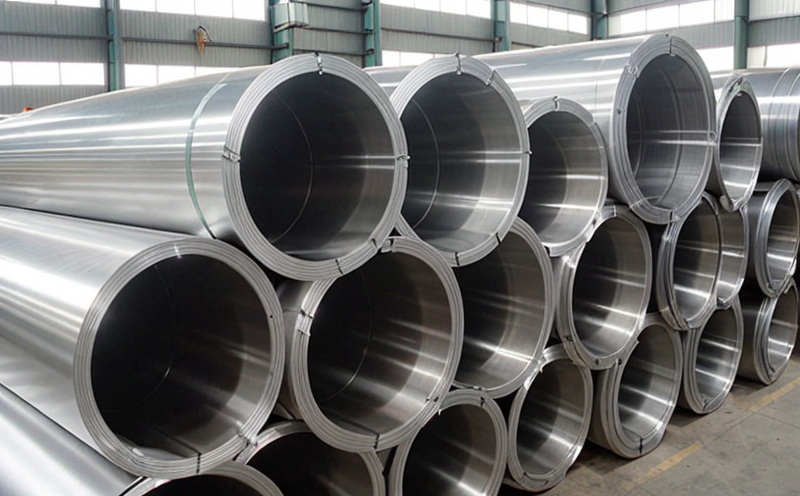IEC 60068-2-75 Impact Resistance Testing of Marine Components
The IEC 60068-2-75 standard specifies procedures for testing the impact resistance of materials and products. This particular test is crucial in ensuring that marine components made from aluminium can withstand the harsh environments they are subjected to. The purpose is not only to assess the structural integrity but also to evaluate how these components will perform under various stress conditions, thus enhancing safety and reliability.
Aluminium has become increasingly popular for marine applications due to its lightweight properties which improve fuel efficiency and reduce maintenance costs. However, it is also susceptible to impact damage, especially in environments characterized by high-energy impacts such as those encountered during ship operations or in rough seas. IEC 60068-2-75 provides a standardized method to measure the impact resistance of aluminium components used in marine equipment.
The testing process involves exposing specimens cut from actual marine component parts to controlled impact forces. Specimens are subjected to impacts using pendulum machines or drop-weight testers, simulating real-world conditions. The primary focus is on determining the energy absorption capacity and deformation characteristics under different impact velocities and angles. This information helps manufacturers optimize material selection and design for better performance in challenging maritime settings.
The test results provide critical data that aids quality managers and compliance officers in meeting regulatory requirements set forth by international standards like IEC 60068-2-75. For R&D engineers, this testing ensures that new materials or component designs meet the necessary safety and performance criteria before being implemented into production. Additionally, it assists procurement teams in selecting suppliers who adhere to these stringent quality assurance measures.
Understanding the impact resistance of aluminium components is essential for ensuring their longevity and reliability across various marine applications including ship hulls, machinery mounts, and structural supports. By adhering to IEC 60068-2-75 standards during development stages, manufacturers can mitigate risks associated with premature failures caused by unexpected impacts.
Compliance officers must stay updated on these standards to ensure their organization meets all relevant regulations. This testing contributes significantly towards maintaining industry best practices and upholding high levels of safety within the maritime sector.
- Specimen Preparation: Specimens are typically cut from actual marine component parts, ensuring accurate representation of real-world conditions.
- Testing Equipment: Pendulum machines or drop-weight testers are used to apply controlled impact forces.
- Impact Velocities: Testing is conducted at various velocities to simulate different scenarios encountered in maritime environments.
- Data Collection: Energy absorption capacity and deformation characteristics are recorded for analysis.
Applied Standards
The IEC 60068-2-75 standard is widely recognized globally as a benchmark for assessing the impact resistance of materials used in marine components. It builds upon other established standards such as ISO and ASTM, which also address similar aspects but may have varying specificities depending on regional requirements.
For instance, ISO 14962 covers general guidelines for testing plastics used in ship construction, while ASTM D7530 focuses more narrowly on plastic pipes subjected to mechanical impact. In contrast, IEC 60068-2-75 provides a comprehensive framework applicable specifically to aluminium materials utilized in marine applications.
The standard outlines detailed procedures including specimen preparation, testing equipment specifications, and data interpretation methods. Compliance with these stringent guidelines ensures consistent results across different laboratories worldwide, facilitating seamless international trade within the maritime industry.
Eurolab Advantages
At Eurolab, we pride ourselves on providing world-class services tailored specifically to meet your unique needs. When it comes to IEC 60068-2-75 impact resistance testing of marine components made from aluminium materials, our state-of-the-art facilities offer unparalleled precision and reliability.
Our team of experienced professionals leverages cutting-edge technology to ensure accurate measurement and interpretation of test results. With extensive experience in the field, they understand both the technical intricacies involved as well as the broader implications for manufacturers and operators alike.
We maintain strict adherence to all applicable international standards including IEC 60068-2-75, ensuring that every test performed meets the highest quality assurance criteria. Our commitment extends beyond just meeting regulatory requirements; we strive to exceed expectations by offering comprehensive support throughout each project lifecycle from initial consultation through final analysis and reporting.
In addition to our technical expertise, Eurolab also offers exceptional customer service. From providing detailed explanations of testing procedures to assisting with interpretation of results, our goal is always to ensure complete satisfaction. By choosing Eurolab for your IEC 60068-2-75 impact resistance tests on marine components made from aluminium materials, you can rest assured that you are receiving top-notch service backed by years of industry experience.





